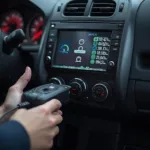A Bluetooth OBD2 adapter is a device that plugs into your car’s OBD2 port and communicates wirelessly with your smartphone or tablet. This allows you to access and monitor your car’s data in real-time, providing valuable insights into its performance, health, and potential issues. But with so many options available, choosing the right Bluetooth OBD2 adapter for your needs can be daunting.
This comprehensive guide will delve deep into the world of Bluetooth OBD2 adapters, exploring their functionalities, benefits, and how to choose the perfect one for your needs.
Why Choose a Bluetooth OBD2 Adapter?
Gone are the days of relying solely on mechanics for car diagnostics. Bluetooth OBD2 adapters empower car owners to take charge of their vehicle’s health. Here’s why:
- Real-Time Diagnostics: Monitor your car’s performance metrics such as speed, RPM, engine temperature, and fuel consumption in real time.
- Read and Clear Diagnostic Trouble Codes (DTCs): Identify the root cause of those pesky check engine lights and clear them if needed.
- Enhanced Car Maintenance: Track fuel economy, monitor emissions, and schedule maintenance reminders for a smoother, more cost-effective ownership experience.
- Cost-Effective Solution: Compared to expensive visits to the mechanic, a Bluetooth OBD2 adapter offers a budget-friendly way to stay on top of your car’s health.
- User-Friendly Interface: Most Bluetooth OBD2 adapters pair with intuitive mobile apps, making it easy even for non-technical users to understand their car’s data.
Choosing the Right Bluetooth OBD2 Adapter
The market is flooded with various Bluetooth OBD2 adapters, each with unique features and price points. Consider these factors when making your selection:
1. Compatibility
Ensure the adapter is compatible with your car’s make, model, and year. Most adapters support a wide range of vehicles manufactured after 1996.
2. Protocols Supported
OBD2 adapters communicate using different protocols. Look for adapters that support common protocols such as SAE J1850 PWM, SAE J1850 VPW, ISO 9141-2, ISO 14230-4 (KWP2000), and ISO 15765-4 (CAN).
3. App Features
The accompanying app plays a crucial role in how you interact with your car’s data. Choose an adapter with an app that offers:
- Intuitive Interface: A user-friendly design for easy navigation and data interpretation.
- Customization Options: Personalized dashboards, data logging features, and adjustable alert settings.
- Data Visualization: Clear graphs and charts to visualize performance trends over time.
- Additional Features: Some apps offer advanced features like trip logging, performance tests, and emissions readiness checks.
4. Data Logging and Sharing
If you want to track your car’s performance over time or share data with your mechanic, opt for an adapter with robust data logging and sharing capabilities.
5. Price and Reviews
Bluetooth OBD2 adapters come in a wide price range. While it’s tempting to opt for the cheapest option, investing in a reputable brand with positive user reviews is recommended for better reliability and accuracy.
Bluetooth OBD2 Adapter vs. Other Types of Scanners
While Bluetooth OBD2 adapters offer a convenient and affordable option, other types of OBD2 scanners are available:
-
Wired OBD2 Scanners: These scanners connect directly to your car’s OBD2 port and typically offer more advanced features and data access. However, they lack the wireless convenience of Bluetooth adapters.
-
WiFi OBD2 Adapters: Similar to Bluetooth adapters, WiFi adapters communicate wirelessly but use your car’s or smartphone’s WiFi network. This can be slower and less reliable than Bluetooth, especially in areas with weak WiFi signals.
Maximizing Your Bluetooth OBD2 Adapter
Here are some tips for getting the most out of your Bluetooth OBD2 adapter:
- Securely Install the Adapter: Ensure the adapter is firmly plugged into your car’s OBD2 port to prevent connection issues.
- Download the Correct App: Use the app recommended by the adapter manufacturer for optimal compatibility and features.
- Understand the Data: Familiarize yourself with the various data points displayed by the app to gain valuable insights into your car’s performance.
- Regularly Check for Updates: Update the app and adapter firmware regularly to access the latest features and bug fixes.
Bluetooth OBD2 Adapter: Empowering Car Owners
Bluetooth OBD2 adapters have revolutionized how car owners interact with their vehicles, providing a user-friendly and affordable way to:
- Stay informed about their car’s health.
- Diagnose and potentially fix minor issues.
- Make informed decisions about maintenance and repairs.
By understanding the functionalities and choosing the right Bluetooth OBD2 adapter, you can become a more empowered car owner, saving both time and money in the long run.
Frequently Asked Questions
Can I use a Bluetooth OBD2 adapter with any car?
Most Bluetooth OBD2 adapters are compatible with vehicles manufactured after 1996 that have an OBD2 port. However, it’s essential to check the adapter’s specifications for compatibility with your specific car make and model.
What is the range of a Bluetooth OBD2 adapter?
The Bluetooth range typically varies between 10 to 30 feet, depending on the adapter and surrounding interference.
Can I leave the Bluetooth OBD2 adapter plugged in all the time?
While it’s safe to leave the adapter plugged in for extended periods, it’s recommended to unplug it when not in use to prevent potential battery drain.
Can I use a Bluetooth OBD2 adapter to tune my car?
No, most Bluetooth OBD2 adapters are designed for reading and clearing diagnostic trouble codes, monitoring live data, and accessing basic car information. They don’t typically support engine tuning or modifications.
For further information and to explore our range of Bluetooth OBD2 adapters, visit our website or contact our expert team. We’re here to help you make the best choice for your car diagnostic needs.
